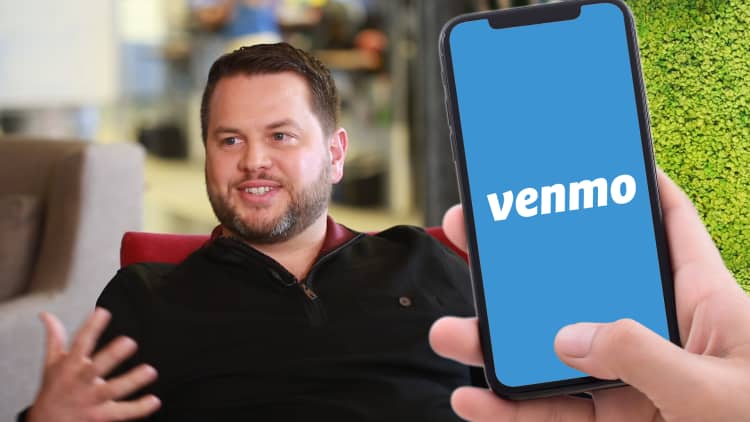Venmo is moving from enabling payments with emojis on a phone to a more traditional method.
The popular app, owned by PayPal, will offer a Venmo-branded credit card in 2020, the company announced Thursday. Synchrony Financial will handle the banking side of the card.
The app started with peer-to-peer payments and became famous for incorporating a social network with the ability to "like" and comment on friends' transactions. Venmo has since brought in 40 million users, launched a debit card last year and offers a "pay with Venmo" option with partners like Uber.
"The next natural extension was to have a Venmo credit card," Darrell Esch, senior vice president of credit at PayPal, told CNBC. "This rounds out what was otherwise a gap with the debit card."

Venmo was acquired for $26 million by Braintree in 2012, and PayPal bought Braintree a year later. It joins a list of tech names that have offered credit cards to increase profits and engage customers. Apple was the most recent high-profile example in a partnership with Goldman Sachs to launch the Apple Card. Amazon offers credit cards and uses Synchrony for its most recent secured card. PayPal is not a bank, so in order to offer bank-like products, it relies on FDIC-insured Synchrony. It's an increasingly popular setup for fintech companies that don't have a bank charter.
Although Synchrony Financial is the one handling the banking side, customers won't be logging onto Synchrony's website. Instead, they pay bills directly on the Venmo app. They can also opt to share payment history on their social feed, split purchases with other people, and get real-time alerts to monitor card activity. PayPal said some of the details, like rewards and cash back, are still being determined.
Monetizing Venmo
Despite Venmo's flood of users, the app has yet to turn a profit. It currently makes money from interchange fees through its debit card and customer deposits that are invested in government-grade securities like Treasurys, and from customers who pay a fee to have money transferred to their bank faster than a typical two-day wait period. PayPal has a profit-sharing agreement with Synchrony for the Venmo credit card that factors in things like purchase volume and number of new accounts.
Esch said several parties were vying for the bank partnership, but he would not say which ones. The Venmo partnership extends a 15-year deal Synchrony already had with PayPal. The bank also powers Amazon, Lowe's, Banana Republic, J.C. Penney and other co-branded credit cards. Those partnerships accounted for $13.1 billion, or 75%, of Synchrony's total interest and fees on loans in 2018. The top five accounts alone, which includes PayPal, made up 44% of the company's loan receivables last year. The firm lost its largest retail partner last year when Walmart announced that after some two decades with Synchrony, Capital One would become its new credit card issuer. The Wall Street Journal reported in April that PayPal and Venmo executives were planning to launch a credit card.
The Venmo card is a way for the bank to diversify away from retail, and dip into the mobile payments boom.
"This is going to a big partnership for us — we know that Venmo is a growing customer base," Synchrony CEO Margaret Keane told CNBC. "This sets us up as a company that can demonstrate digital savviness and innovation and at the same time, and leverage things we've done in the past, like managing the relationship with a partnership and building out great analytics."


